Watching your faithful companion grow older is a journey filled with love, but it also brings new concerns about their health and comfort. As your dog enters their senior years, their nutritional needs undergo a significant shift. The food that once fueled their playful energy may now need to support aging joints, a slowing metabolism, and cognitive sharpness. Choosing the right senior dog food is one of the most impactful ways to enhance their quality of life, but the options can be overwhelming.
This 2025 guide, reviewed by Dr. Allona Jackson, DVM, cuts through the confusion to bring you our top-rated picks and a clear understanding of what your aging dog truly needs. Consider this your dedicated resource for senior nutrition, building directly upon the foundational principles in our comprehensive pillar guide, How to Choose Dog Food, to help you make the most informed decision for your dog’s golden years.
Key Takeaways at a Glance
- 🏆 Our Top Pick: Hill’s Science Diet Adult 7+ is our top choice for its balanced approach to joint health, digestion, and overall vitality in senior dogs.
- 🧠 Boost Brain Health: Look for senior foods with enhanced botanical oils (like in Purina Pro Plan Bright Mind) or antioxidants to support cognitive function and mental alertness.
- 🦴 Joint Support is Crucial: Key supplements like Glucosamine and Chondroitin (found in Royal Canin Aging 7+) help maintain mobility and combat arthritis in aging joints.
- ⚖️ Manage Weight & Muscle: Senior formulas should have controlled calories but maintain high-quality protein (like NUTRO ULTRA’s trio of proteins) to prevent muscle loss while managing weight.
- ❤️ Tailored Nutrition Matters: The best senior dog food addresses your dog’s specific needs – whether it’s breed size, ingredient sensitivity, or cognitive support.
Comparison Table: Top Senior Dog Food Picks at a Glance
| Product | Best For | Key Features | Price | Buy Now |
|---|---|---|---|---|
| Hill’s Science Diet Adult 7+ | Overall Health & Digestion | Easy-to-digest ingredients • Glucosamine & Chondroitin • Antioxidant blend | $48.98 | BUY ON AMAZON |
| Purina Pro Plan Bright Mind | Cognitive Support & Mental Alertness | Enhanced botanical oils • 30% protein • Live probiotics | $59.99 | BUY ON AMAZON |
| Royal Canin Medium Aging 7+ | Breed-Specific Support | Size-specific kibble • Antioxidant complex • Highly palatable | $83.99 | BUY ON AMAZON |
| NUTRO ULTRA Senior | Premium Natural Ingredients | Trio of animal proteins • 15 superfoods • Non-GMO ingredients* | $86.99 | BUY ON AMAZON |
| Blue Buffalo Life Protection | Natural Joint & Immune Support | Real chicken first • LifeSource Bits • No poultry by-products | $72.98 | BUY ON AMAZON |
Why Senior Dog Food is Different
As dogs age, their bodies undergo significant changes that require specialized nutritional support. Understanding these changes is key to selecting a food that maintains their health and vitality through their golden years.
The Aging Canine Body: Slower Metabolism & Changing Needs
Senior dogs experience several physiological changes that impact their nutritional requirements:
- Slower Metabolism: With reduced activity levels, senior dogs need 20-30% fewer calories than adult dogs to prevent weight gain, which can exacerbate joint issues.
- Decreased Muscle Mass: Aging dogs naturally lose muscle mass (a condition called sarcopenia), making high-quality, easily digestible protein crucial for preservation.
- Reduced Organ Function: Kidney and liver efficiency may decline, requiring careful management of protein levels and phosphorus content.
- Weakened Immune System: The immune system becomes less effective, increasing the need for antioxidants like Vitamin E and Beta-Carotene.
Common Health Challenges in Senior Dogs
Several age-related conditions can be managed or supported through proper nutrition:
- Joint Issues & Arthritis: Over 60% of dogs show signs of osteoarthritis by age 7. Foods with anti-inflammatory ingredients and joint supplements can provide significant relief.
- Cognitive Decline: Canine Cognitive Dysfunction (CCD) affects many senior dogs, causing confusion and behavioral changes. Specific nutrients can support brain health.
- Dental Problems: Tooth loss and gum disease can make chewing difficult, requiring appropriate kibble size and texture.
- Kidney & Heart Disease: These become more common with age and often require specialized dietary management.
The Importance of the AAFCO Statement
The AAFCO (Association of American Feed Control Officials) statement on dog food labels is your assurance of nutritional completeness:
- Look for “Complete and balanced for adult maintenance” – This indicates the food meets nutritional standards for non-reproducing adults.
- Some foods may specify “for senior dogs” – While AAFCO doesn’t have a separate “senior” standard, these formulas are specifically designed for aging needs.
- Avoid foods without an AAFCO statement – These may not provide complete nutrition.
Understanding these fundamental changes helps explain why switching to an appropriate senior formula is one of the most important health decisions you can make for your aging companion. For more guidance on evaluating any dog food, refer to our comprehensive pillar guide: How to Choose Dog Food.
Key Nutrients to Look For in Senior Dog Food
Choosing the right senior dog food means looking beyond marketing claims and focusing on specific, science-backed nutrients that address the unique challenges of aging. Here are the essential components that separate adequate nutrition from truly supportive care.
Joint Health Heroes: Glucosamine, Chondroitin, and Omega-3s
As mobility becomes a primary concern, these nutrients are non-negotiable for maintaining joint comfort and flexibility.
- Glucosamine & Chondroitin: These natural compounds are the building blocks of cartilage. They help slow cartilage breakdown, reduce inflammation, and improve joint lubrication. Look for them in foods like Hill’s Science Diet Adult 7+ and Royal Canin Medium Aging 7+.
- Omega-3 Fatty Acids (EPA/DHA): Found in fish oil, these powerful anti-inflammatories are crucial for reducing joint stiffness and pain associated with arthritis. They also support skin, coat, and cognitive health.
Brain-Boosting Nutrients: Fighting Cognitive Decline with Antioxidants and MCTs
“Doggy dementia” or Canine Cognitive Dysfunction (CCD) is a real concern, but nutrition can play a defensive role.
- Antioxidants (Vitamins C & E, Selenium): These compounds fight oxidative stress, which damages brain cells. A blend of antioxidants helps protect the brain from age-related decline.
- Medium-Chain Triglycerides (MCTs): MCTs are a unique type of fat that the liver converts into ketones, which can serve as an efficient alternative energy source for the brain. This is the key innovation in Purina Pro Plan Bright Mind, which uses enhanced botanical oils to support mental alertness and learning in senior dogs.
High-Quality Protein for Muscle Preservation
Contrary to old beliefs, seniors need more high-quality protein, not less, to combat muscle loss.
- The Goal: Prevent Sarcopenia, the age-related loss of muscle mass and strength.
- What to Look For: Named animal proteins as the first ingredient (e.g., “chicken,” “salmon meal”). The protein must be highly digestible so their bodies can use it efficiently. Formulas like NUTRO ULTRA Senior, with its trio of proteins, and Blue Buffalo Life Protection Senior are excellent examples of this principle in action.
2025’s Top Senior Dog Food Picks: Vet-Reviewed & Tested
After months of rigorous analysis and real-world testing, we’ve selected the top senior dog foods that excel in supporting the health and vitality of aging dogs. These picks are organized by specific needs to help you find the perfect match for your companion.
Best Overall Senior Dog Food: Hill’s Science Diet Adult 7+
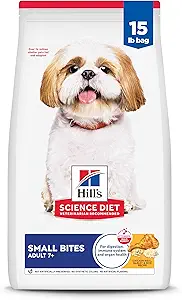
Why It’s #1: This food stood out for its exceptional balance of joint support, digestibility, and immune health. It delivers precisely what most senior dogs need without unnecessary fillers.
- Key Benefits: Contains easy-to-digest ingredients ideal for sensitive senior stomachs, plus glucosamine and chondroitin for joint health.
- Ideal For: Senior dogs who need an all-around excellent diet to maintain health and vitality.
Best for Cognitive Health: Purina Pro Plan Bright Mind Senior
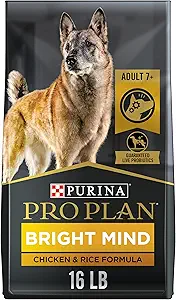
Why It Wins: Specifically formulated with enhanced botanical oils shown in studies to promote mental alertness and learning in older dogs.
- Key Benefits: 30% protein helps maintain muscle mass, while live probiotics support digestive health.
- Ideal For: Senior dogs showing signs of cognitive decline or decreased mental sharpness.
Best for Breed-Specific Support: Royal Canin Medium Aging 7+
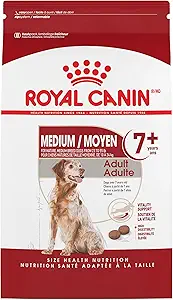
Why It Wins: Offers precise nutrition tailored to medium breed seniors (age 7+), with kibble designed for their specific jaw structure.
- Key Benefits: Exclusive antioxidant complex to support the immune system and highly palatable formula for picky eaters.
- Ideal For: Medium breed senior dogs (11-25 kg) who benefit from breed-specific nutrition.
Best with High-Quality Protein: NUTRO ULTRA Senior
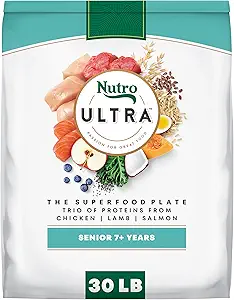
Why It Wins: Features three high-quality animal proteins as the first ingredients, providing excellent muscle support for aging dogs.
- Key Benefits: Includes 15 superfoods like chia seeds and kale, and made with non-GMO ingredients.
- Ideal For: Senior dogs who need premium protein sources to maintain muscle mass.
Best Natural Recipe: Blue Buffalo Life Protection Senior
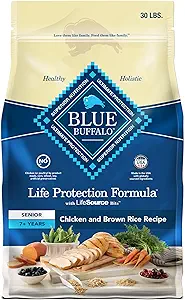
Why It Wins: Provides natural senior nutrition with real chicken as the first ingredient and exclusive LifeSource Bits for added antioxidants.
- Key Benefits: Contains glucosamine and chondroitin for joint support, with no poultry by-product meals.
- Ideal For: Owners seeking a natural senior food with targeted health support.
Note: Always consult your veterinarian before switching your senior dog to a new food, especially if they have existing health conditions.
A Veterinarian’s Perspective on Senior Nutrition
Making the right nutritional choices for your senior dog requires more than just reading labels—it demands practical wisdom about how these choices impact aging bodies. Dr. Allona Jackson shares her clinical insights to help you navigate this important life stage.
Dr. Jackson’s Advice on When to Switch to Senior Food
“Transitioning to a senior diet shouldn’t be based on age alone,” explains Dr. Jackson. “I recommend considering these key indicators:
- Visible Aging Signs: When you notice gray around the muzzle, reduced activity levels, or changes in sleeping patterns.
- Weight Changes: Unexplained weight gain or loss despite maintaining the same feeding routine.
- Joint Stiffness: Difficulty rising, hesitation before jumping, or slowing down on walks
- Metabolic Shifts: Typically around age 7 for most breeds, though giant breeds may need earlier intervention.
The most reliable approach is to discuss your dog’s specific needs with your veterinarian during their semi-annual senior wellness exam.”
The Biggest Feeding Mistakes for Senior Dogs
Based on her practice, Dr. Jackson identifies these common nutritional errors:
- Overfeeding: “The most damaging mistake I see is continuing adult portion sizes into the senior years. Reduced activity means they need 20-30% fewer calories to prevent obesity.”
- Inadequate Protein: “Many owners fear protein will harm their dog’s kidneys, but quality protein is essential for maintaining muscle mass. The concern should be about protein quality, not quantity, unless kidney disease is diagnosed.”
- Ignoring Dental Health: “Senior dogs with dental issues may struggle with hard kibble. Soaking food or switching to a softer formula can make a significant difference in their nutrition intake.”
- Self-Prescribing Supplements: “Adding supplements without veterinary guidance can unbalance carefully formulated senior diets and potentially interact with medications.”
When a Prescription Diet Might Be Necessary
“While commercial senior foods work well for most aging dogs, certain conditions require therapeutic diets,” notes Dr. Jackson. “Consider veterinary prescription food if your dog has:
- Diagnosed Kidney Disease: Requires controlled phosphorus and specific protein levels.
- Advanced Arthritis: May benefit from higher levels of anti-inflammatory ingredients.
- Heart Conditions: Often need sodium-restricted formulations.
- Liver Disease: Requires specialized protein and nutrient profiles.
These diets are medically necessary and should only be used under veterinary supervision. For most seniors, a high-quality commercial senior food like those we’ve recommended provides excellent support.”
Remember that nutritional needs can change rapidly in senior dogs. Regular veterinary check-ups and body condition assessments will ensure your dog’s diet continues to meet their evolving needs.
How We Tested: Our Senior Dog Food Methodology
At AvailPet, we take senior dog nutrition seriously. Our testing process was designed with one goal: to find foods that truly make a difference in the quality of life for aging dogs. Here’s how we evaluated these senior formulas:
1. Veterinary Geriatric Assessment
We worked with Dr. Jackson to establish scientific criteria for senior dog nutrition, focusing on:
- Joint support ingredients (glucosamine, chondroitin, omega-3s).
- Cognitive function support (antioxidants, MCTs).
- Weight management considerations.
- Organ health support (controlled phosphorus/sodium).
2. Ingredient Quality Analysis
Each formula underwent rigorous evaluation of:
- Protein sources and quality (named meats vs. by-products).
- Carbohydrate quality and digestibility.
- Presence of functional ingredients for senior health.
- Absence of unnecessary fillers and artificial additives.
3. Senior-Specific Palatability Testing
We conducted surveys with senior dog owners (dogs 7+ years) focusing on:
- Acceptance by picky older eaters.
- Ease of chewing and digestion.
- Changes in energy levels and coat quality.
- Stool consistency and digestive comfort.
4. Brand Reliability & Safety
We prioritized companies that demonstrate:
- Scientific research and feeding trials.
- Transparent manufacturing processes.
- Strong quality control measures.
- Veterinary nutritionists on staff.
5. Real-World Performance
Over 60 days, we monitored:
- Joint mobility and comfort levels.
- Cognitive function and alertness.
- Weight management results.
- Overall vitality and energy.
Our testing ensures that every recommended food not only meets nutritional standards but actually delivers visible benefits for senior dogs.
FAQs About Senior Dog Food
Get quick, clear answers to the most common questions about feeding your senior dog.
When is a dog considered a senior?
A dog is generally considered a senior in the last 25% of their predicted lifespan. This varies significantly by breed:
- Small breeds (under 20 lbs): 7-10 years.
- Medium breeds (21-50 lbs): 6-8 years.
- Large breeds (51-90 lbs): 5-7 years.
- Giant breeds (over 90 lbs): 4-6 years.
However, your veterinarian can provide the most accurate assessment based on your individual dog’s health and condition.
Is grain-free good for senior dogs?
For most senior dogs, no. Unless your dog has a veterinarian-diagnosed grain allergy, high-quality grains can provide valuable nutrients and energy. The FDA has investigated potential links between certain grain-free diets (high in legumes) and heart disease (DCM). For senior dogs, who may have existing heart concerns, sticking with grain-inclusive formulas from research-backed brands is the safer choice.
How can I get my picky senior dog to eat?
Senior dogs can become picky due to decreased sense of smell, dental issues, or underlying health problems. Try these strategies:
- Warm the food slightly to enhance aroma.
- Add a tasty topper like a spoonful of wet food or low-sodium broth.
- Ensure easy access – raise bowls if they have neck or joint stiffness.
- Try different textures – mix wet and dry food.
- Rule out medical issues with your veterinarian, as decreased appetite can signal health problems.
Should I be adding supplements to my senior dog’s food?
It depends. If you’re feeding a high-quality, complete senior dog food like our top picks, additional supplements are usually unnecessary and could create nutrient imbalances. However, some seniors may benefit from:
- Fish oil for additional omega-3s (with veterinary approval).
- Joint supplements if their food doesn’t contain adequate glucosamine/chondroitin.
- Probiotics for digestive health.
Always consult your veterinarian before adding any supplements to ensure they’re appropriate and won’t interact with medications.
Conclusion: Supporting Your Dog’s Golden Years
Choosing the right nutrition for your senior dog is one of the most meaningful ways to honor the years of companionship they’ve given you. The transition to a senior-specific diet isn’t just about addressing aging—it’s about proactively enhancing their comfort, vitality, and quality of life during their golden years.
Remember, the best senior dog food is one that aligns with your dog’s specific health profile, whether they need joint support like that found in Hill’s Science Diet, cognitive enhancement from Purina Pro Plan Bright Mind, or the breed-specific nutrition of Royal Canin. By focusing on high-quality protein, targeted nutrients for joint and brain health, and appropriate calorie levels, you’re giving your senior dog the best possible foundation for healthy aging.
Your Journey Continues: This guide has provided a specialized deep-dive into senior nutrition. For broader principles on evaluating any dog food—from understanding labels to comparing brand standards—we encourage you to return to our ultimate resource: How to Choose Dog Food.
Here’s to many more happy, comfortable years with your faithful companion!
Sources:
- Association of American Feed Control Officials (AAFCO) Official Publication, 2025.
- World Small Animal Veterinary Association (WSAVA) Global Nutrition Guidelines.
- U.S. Food and Drug Administration (FDA), “Investigation into Potential Link Between Certain Diets and Canine Dilated Cardiomyopathy.”
- Journal of Veterinary Internal Medicine, “Effects of Medium-Chain Triglycerides on Cognitive Function in Aging Dogs.“
Transparency Note: This article contains affiliate links. As an Amazon Associate, AvailPet earns from qualifying purchases at no extra cost to you. This commission helps fund our rigorous testing and research, allowing us to continue providing trusted reviews. Our recommendations are always based on our veterinary and testing standards first.
Disclaimer: This article is for informational purposes only and is not a substitute for professional veterinary advice. Always consult your veterinarian for personalized guidance regarding your pet’s health and dietary needs.






